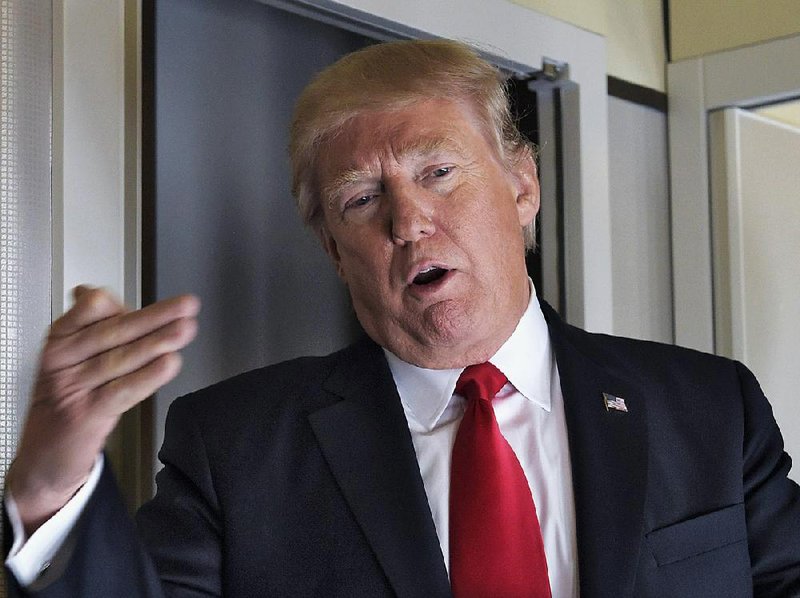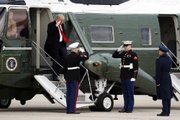WASHINGTON -- President Donald Trump's administration ordered sanctions Friday against more than two dozen people and companies from the Persian Gulf to China in retaliation for Iran's recent ballistic missile test, increasing pressure on Tehran without directly undercutting a nuclear deal with the country.
RELATED ARTICLES
http://www.arkansas…">Over 100,000 visas revoked, judge is told http://www.arkansas…">Bail set for Searcy teen alien as U.S. shifts prioritieshttp://www.arkansas…">Calls clog Capitol phones as Trump rolls out plans http://www.arkansas…">Israeli settlers shrug off U.S.' criticism http://www.arkansas…">Trump meets with execs after Uber chief backs out http://www.arkansas…">Education pick up for final vote http://www.arkansas…">Massacre reference an error, adviser sayshttp://www.arkansas…">SEC's interim chief itching to overhaul financial rule book http://www.arkansas…">Ford, Trump detente faces test over order on refugees
Those targeted by the Treasury Department include Iranian, Lebanese, United Arab Emirates and Chinese individuals and companies involved in procuring ballistic missile technology for Iran. They are now prohibited from doing any business in the United States or with American citizens. The overall effect is likely to be minimal on Iran's economy, though some of the people and companies have relationships with Iran's hard-line Revolutionary Guard military forces.
"The days of turning a blind eye to Iran's hostile and belligerent actions toward the United States and the world community are over," Michael Flynn, Trump's national security adviser, said in a statement.
Although White House spokesman Sean Spicer acknowledged that much of the legwork had occurred under President Barack Obama, he said the Trump administration "acted swiftly and decisively" after Iran's recent missile test and Iran-backed rebels in Yemen firing on a Saudi naval vessel.
[PRESIDENT TRUMP: Timeline, appointments, executive orders + guide to actions in first 100 days]
It is Trump's first package of penalties against Iran, reflecting his insistence on a tougher stance toward Tehran. Throughout his election campaign, Trump accused the Obama administration of being weak on Iran, and he vowed to crack down if elected.
Iran has acknowledged that it conducted a missile test. But it insists the test didn't violate the 2015 nuclear accord it reached with the United States and five other world powers, or a subsequent U.N. Security Council resolution extending an eight-year ban on ballistic missiles "designed to be capable of delivering nuclear weapons." Washington, under Obama and Trump, and its Western allies agree the matter is separate from the nuclear pact but maintain that the missile tests violate the U.N. ban.
"Iran's continued support for terrorism and development of its ballistic missile program poses a threat to the region, to our partners worldwide, and to the United States," said John Smith, acting director of Treasury's Office of Foreign Assets Control. "Today's action is part of Treasury's ongoing efforts to counter Iranian malign activity abroad that is outside the scope of [the nuclear pact]. We will continue to actively apply all available tools, including financial sanctions, to address this behavior."
Iran's Foreign Ministry decried the new U.S. sanctions as "illegitimate." It vowed countersanctions on U.S. companies and individuals.
Iran already has a formidable arsenal of thousands of short- and medium-range ballistic missiles capable of reaching Israel and other U.S. allies in the Middle East, as well as U.S. bases, and has undertaken a series of tests in the year and a half since the nuclear agreement. The U.S. said the latest launch was of a medium-range missile, and a U.S. defense official described it as failing re-entry into the earth's atmosphere.
In a tweet Friday morning, Trump wrote, "Iran is playing with fire -- they don't appreciate how 'kind' President Obama was to them. Not me."
A senior administration official, speaking to reporters on condition of anonymity under its ground rules, characterized Friday's sanctions as an "initial" step in an ongoing effort to force the government in Tehran to act differently and stop being a threat to U.S. allies in the region.
"Iran has to determine its response to our actions," the official said. "Iran has a choice to make. We are going to continue to respond to their behavior in an ongoing way, at an appropriate level, to continue to pressure them to change their behavior."
The sanctions targeted several individuals allegedly involved in laundering money for Hezbollah militants in Lebanon. The administration official also criticized Iranian-armed Houthi forces in Yemen for attacking United Arab Emirates and Saudi ships and acting aggressively toward U.S. ships transiting the Red Sea.
"They continue to threaten U.S. friends and allies in the region," the official said.
The sanctions won immediate praise from opponents and skeptics of the nuclear agreement.
Sen. Bob Corker, R-Tenn., chairman of the Senate Foreign Relations Committee, called them "long overdue."
"This announcement makes clear that it is a new day in U.S.-Iran relations and that we will no longer tolerate Iran's destabilizing behavior," he said. "A coordinated, multifaceted effort to push back against a range of illicit Iranian behavior is long overdue."
'unmoved,' tweet says
The new sanctions represent a continuation of the Obama administration's limited punishment for Iran's ballistic-missile activity and avoid a direct showdown with Iran over the nuclear deal itself. The sanction targets were drawn up before Obama left office and don't affect Iran Air, a big Iranian bank or any major government entity, making it unclear how effective the penalties prove as deterrents.
None of the new penalties reversed Obama's suspension of sanctions under the nuclear pact. Obama himself promised after the deal to continue going after Iran with non-nuclear penalties in response to missile launches, terror support or human-rights abuses, and did so in January and March of last year.
"This is part of a much broader strategy and merely a sign of coming attractions," said Mark Dubowitz, CEO of the Foundation for Defense of Democracies, who advises the administration and Congress on Iran-related issues.
On missiles, Iran said it would be undeterred.
Foreign Minister Javad Zarif tweeted Friday that his country was "unmoved by threats as we derive security from our people. We'll never initiate war, but we can only rely on our own means of defense."
"Our missile drills are a show of our might," added a senior Iranian cleric, Ayatollah Ahmad Khatami. "We are living in a world of wolves -- wolves such as the arrogant government of America. In this world of wolves, should we remain unarmed and they do whatever damn things they want? No way! This will never happen!"
Iran's leaders have argued that any new U.S. sanctions would violate the nuclear deal.
The agreement compelled Iran to curtail its enrichment of uranium, a material that can be used in atomic bombs, and other nuclear-related activity. In exchange, Iran received broad relief from U.S. and international sanctions that were crippling its economy. Trump has ridiculed the arrangement as a terrible deal, but America's closest allies in Europe as well as Russia and China are committed to it.
In the final days of the nuclear negotiations, Tehran agreed to an eight-year extension of a ban on ballistic work. That understanding was codified in a U.N. Security Council resolution passed in parallel, but separately, to the nuclear accord.
During last year's presidential campaign, Trump repeatedly slammed the nuclear agreement. He said the Obama administration tolerated Tehran's continued ballistic missile tests and destabilizing activities in the region so as not to derail an agreement that was an important part of Obama's legacy.
Information for this article was contributed by Vivian Salama, Matthew Lee and Nasser Karimi of The Associated Press and by Carol Morello, Anne Gearan and Erin Cunningham of The Washington Post.
A Section on 02/04/2017

